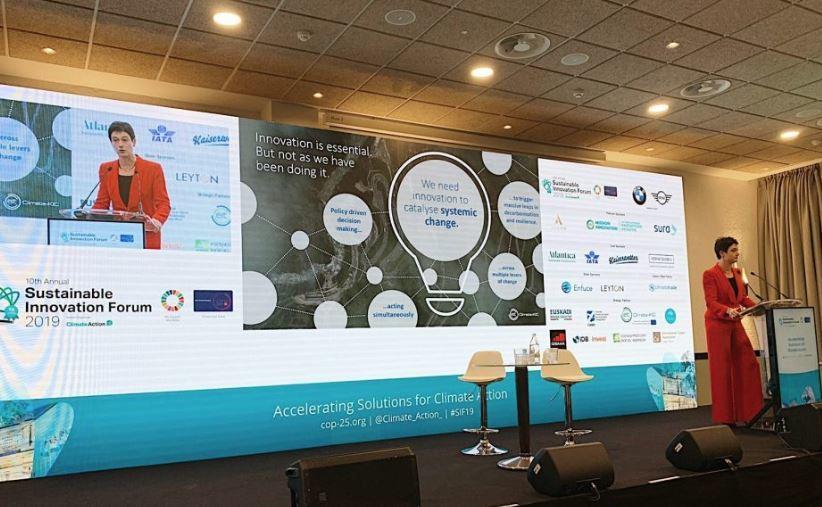COP25: Climate leader insights

With the carbon costs of travel in mind, key EIT Climate-KIC COP25 session summaries are available online for those who cannot attend—and for review for those present. These summaries aim to extract important debates, dialogues, and learnings from each session.
Yesterday, EIT Climate-KIC’s CEO Kirsten Dunlop delivered a keynote speech, “Climate Leader Insights: Innovating for the Climate Emergency” at the Sustainable Innovation Forum’s COP25 event. The speech explored what innovation could look like at a systems level, proposing integrated and coordinated interventions in economic, political and social systems as a way to tackle the climate emergency.
Dunlop said understanding climate change as an emergency could help galvanise action and bring us closer to a net-zero future. However, we also need to rethink our approach:
“I hear what we need is action, and that we have the solutions already. But we’re not bringing solutions together. One of our critical challenges is we’re still looking for unicorns as solutions to our problems. We’re doing less rethinking of underpinning assumptions,” said Dunlop. “We need to move away from trying to pick winners and losers to collaboration and radical uncertainty.”
EIT Climate-KIC is now attempting to do this; to transition from supporting incremental change towards accelerating systemic change. To achieve this, it proposes shifting from single-point solutions towards a portfolio approach: Supporting and connecting systems interventions to one another such that they mutually drive impact. The organisation is calling these systems innovation projects “Deep Demonstrations.”
Partnerships are also key to unlocking systems change: Partnering with local stakeholders living within the realities of the current system can help re-orient climate action towards being demand-led, instead of supply-led.
“Assume and understand we do not have answers: We don’t know how to change systems simultaneously in the next eight years,” said Dunlop. “Our strategy is to place a wide spread of bets and learn by doing.”
She said the quicker we can create examples of what alternative systems look like, the quicker we can work with each other to adopt them across borders.
EIT Climate-KIC’s Deep Demonstrations are designed with this intention in mind and are coordinated with different countries, regions and cities across the European Union. Specifically, the organisation is supporting the government of Slovenia on moving towards a circular economy. It’s also working with 15 cities on city-wide decarbonisation, called “Healthy, Clean Cities.”
Dunlop also emphasised the concept of innovation needs to stop perpetuating a notion of prosperity through consumption. She sees a relationship to time that focuses on the short-term—which is also deeply embedded in our financial systems—as one of the sources of this problematic perspective. The reality is: Infinite growth isn’t possible on a finite planet, and the more we excessively consume natural resources, the more we propel ourselves towards an uninhabitable planet.
“We need to shift away from a financial system that discounts the future in favour of the present,” said Dunlop.
News published on Climate KIC
Consult the source



